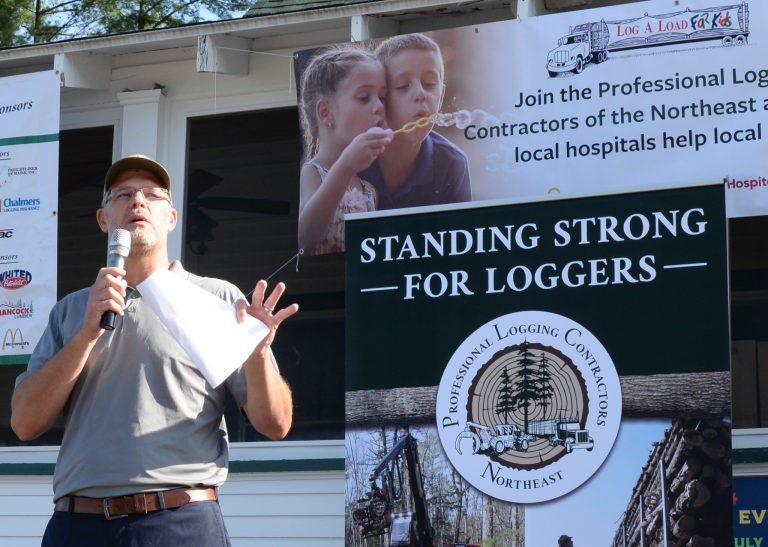PLC issues statement praising Senate action on biomass energy
AUGUSTA – The Professional Logging Contractors (PLC) of Maine issued a statement today praising a vote by the U.S. Senate Tuesday night to accept an amendment to a comprehensive energy bill directing federal agencies to recognize the carbon neutrality of forest biomass-derived energy.
Senator Susan Collins (R-Maine) offered the amendment – which passed by a voice vote – with “tri-partisan” co-sponsorship from Senators Angus King (I-Maine) and Amy Klobuchar (D-Minnesota). The PLC applauded their leadership in securing this critical provision in the Senate’s energy bill (S 2012), the Energy Policy Modernization Act.
“Biomass has been recognized by the President as a clean, renewable fuel,” PLC Executive Director Dana Doran, said. “With the leadership of Senator Collins and Senator King, this amendment will ensure consistency as well as the further recognition of the President’s goals and biomass’ place in our energy mix. As Maine’s biomass market is in a state of flux, this action by Maine’s Senate leadership is vital for Maine’s loggers and healthy forests across the country.”
If the bill passes both the Senate and the House with the provision it would clear up uncertainties in the federal Environmental Protection Agency (EPA) position on how the Obama Administration’s Clean Power Plan treats forest-derived biomass in bio-energy generation, and support the key role forests can play in helping to meet our nation’s energy needs.
Specifically, Senator Collins’ amendment would require the Secretary of Energy, the Secretary of Agriculture, and the Administrator of the Environmental Protection Agency to jointly ensure that federal policy relating to forest bioenergy is consistent across all departments and agencies and that the full benefits of forest biomass for energy, conservation, and responsible forest management are recognized. The amendment would also direct these federal agencies to establish clear and simple policies for the utilization of biomass as an energy solution.
These include policies that:
- Reflect the carbon neutrality of forest bioenergy;
- Recognize biomass as a renewable energy source;
- Encourage private investment throughout the biomass supply chain;
- Encourage forest management to improve forest health;
- And recognize state initiatives to use biomass.
Senators Kelly Ayotte (R-NH), Al Franken (D-MN), Steve Daines (R-MT), Mike Crapo (R-ID), and James Risch (R-ID) are cosponsors of the amendment.
The recent and rapid decline in the price of natural gas has cut deeply into demand for biomass, and Maine loggers saw the market tighten significantly in the second half of 2015. In addition, expiring renewable energy subsidies in Massachusetts and Connecticut have the potential of eliminating the market for Maine biomass altogether as soon as 2017.
Covanta Energy recently announced it plans to close its two biomass electricity plants in Maine due to lower fossil fuel prices that have weakened demand for biomass energy. With the announcement by Covanta, only four large biomass electricity plants, all owned by ReEnergy LLC, will remain in operation in the state.
Biomass represents 60 percent of Maine’s renewable energy portfolio. Wood accounts for almost one-third of New England’s entire renewable supply, with Maine supplying a significant amount to the region, according to the Biomass Power Association.
Biomass electricity is generated by utilizing wood fuel from a variety of sources including woody debris and low grade fiber from forest thinning operations. Fuel gathered in this way provides both a market for low grade fiber and a sustainable source of carbon-neutral energy. In states with renewable energy portfolio requirements woody biomass is very valuable to buyers seeking a percentage of their power from renewable sources.
Unlike renewable energy sources such as wind and solar, biomass has the advantage of being independent of weather as the fuel can be stored and utilized when needed. This reliability accounts in part for its growing popularity in Europe and other areas seeking a larger percentage of their power from renewable sources.
State policies that encourage greater use of biomass in Maine and neighboring states will support local jobs, ensure greater energy security, and reduce fossil fuel emissions. The economic value of a strong Maine biomass industry and the direct and indirect jobs, payroll, and tax revenue it generates will more than offset the current higher cost per kilowatt hour of such energy, while preserving the industry for the day when fossil fuel prices inevitably rise again.
Maine’s loggers are a vital part of the state’s forest products sector, which is worth an estimated $8 billion annually.
The PLC of Maine was formed in 1995 to give independent logging contractors and sole proprietors a voice in a rapidly changing forest industry. A Board of Directors made up entirely of loggers makes the PLC the only logging organization in Maine run by loggers for loggers. The mission of the PLC is to promote logging as a profession, advocate for logging professionals, cultivate responsible forest management, and sustain a strong forest products industry. PLC members are responsible for 75 percent of the timber that is harvested from Maine’s forests annually.
Learn more about the PLC at www.maineloggers.com.



